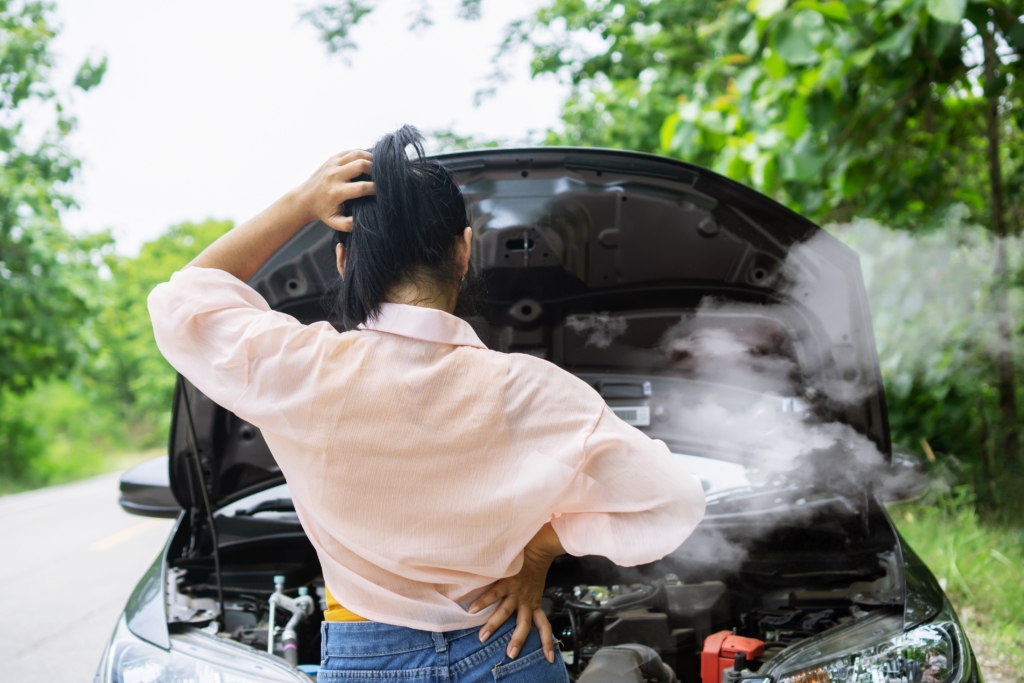Your vehicle’s engine depends on your car’s cooling system to operate safely and efficiently. If your engine isn’t properly cooled, it will overheat, and the results can be serious—including warping of metal parts or (worst case) a cracked engine block. Knowing the most common causes of overheating can help you prevent potential problems before you end up in need of roadside assistance or an expensive repair.
What causes a vehicle to overheat? Let’s examine some common causes of engine overheating.
Low Coolant Levels
Coolant is essential to maintaining your engine at a safe temperature. It absorbs heat from the engine, then circulates it to your vehicle’s radiator where it is cooled. Insufficient coolant, whether the result of a coolant leak or improper maintenance, can cause your engine to overheat.
Thermostat Failure
Our vehicle’s thermostat is responsible for controlling the flow of coolant. If your thermostat is not working properly, it can cause too little coolant to flow through the engine, resulting in overheating. In extreme cases, the thermostat may shut off the flow of coolant even when the engine is hot.
Faulty Water Pump
Coolant is circulated through your car’s engine by means of a water pump. If your vehicle’s water pump is failing (or has failed), you’ll notice the temperature needle move toward the red. If you suspect a faulty pump, it should be replaced immediately. A leaking or ruptured hose can rob your car of coolant. An experienced tech can help pinpoint the leak and avoid more costly repair.
Radiator Damage
Another potential cause of overheating is damage to your vehicle’s radiator or radiator cap. Your car’s radiator is built as a closed system, but leaks can and do occur. A leak in your car’s radiator or water line can deplete your coolant supply and result in incomplete cooling.
Radiator Fan Problems
Another vital aspect of your vehicle’s cooling system is the large fan behind your vehicle’s radiator. This keeps fresh air flowing against your radiator to facilitate heat disbursement. If your fan stops working (or operates only at low speed), you will experience ineffective cooling and are at risk for a boil-over.
Head Gasket Failure
The head gasket separating your vehicle’s engine block from the cylinders can fail, and if it does, oil can flow into the coolant system, and coolant into the engine. Head gasket failure is a serious problem that can result in a costly fix. You may notice a milky white smoke coming from your vehicle’s tailpipe. See your car care professional as soon as possible.
Spotting Potential Causes of Overheating
The best way to avoid an overheating problem is to keep up with regular auto maintenance. Also, inspect your car’s engine and radiator yourself. Often a leaking hose or ruptured radiator is easy to spot. Also be vigilant about the way you operate your vehicle. For example, don’t use your vehicle to tow heavy loads idf it was not designed to do so. Overtaxing your vehicle’s transmission can cause an overheat, so if you plan to do any heavy hauling, you may want to invest in a separate cooling system for your transmission.
At Main Line Transmissions, professional technicians will examine your vehicle for signs of damage, wear, or neglect. Our technicians are here to care for your vehicle and offer you tips on regular maintenance and troubleshooting. Don’t wait until your vehicle overheats. Make an appointment and come in today!

 : 610-647-8484
: 610-647-8484 : 610-647-8405
: 610-647-8405
